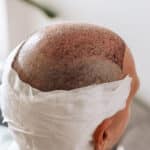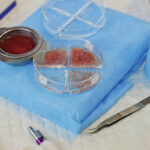Modern aesthetic medicine, and particularly hair transplant surgery, delivers excellent results in combating baldness. However, even the most advanced techniques, such as the FUE (Follicular Unit Extraction) method, require more than just surgical precision — they also need favorable regeneration conditions. One of the most important, yet often underestimated, factors affecting the success of a hair transplant is stress.
Stress and hair health – what does science say?
Psychological stress affects the entire body, including the scalp and hair follicles. Chronic stress increases the production of cortisol – a hormone that can disrupt the hair growth cycle and, in severe cases, trigger telogen effluvium. In this condition, the body “switches off” part of the follicles from the active growth phase, causing excessive shedding.
For patients considering or recovering from a transplant, this is crucial information – severe stress can negatively affect graft survival and delay the regrowth of new hair. Additionally, psychological strain can increase the risk of inflammation, impair scalp blood circulation, and weaken the body’s ability to heal.
How can stress affect hair transplant results?
After a hair transplant, the body begins a long healing process that involves tissue remodeling and the growth of new hair. This period requires rest, proper nutrition, and the absence of disruptive factors. Stress – especially chronic – may interfere with recovery by:
- slowing the growth of transplanted hair,
- increasing the shedding of neighboring hair (shock loss),
- disrupting hormonal balance,
- weakening the immune system and slowing scalp recovery.
In stressed patients, scalp blood supply may decrease, limiting oxygen and nutrient delivery to the grafts. This can make follicles more vulnerable to slower healing, micro-injuries, infections, or inflammation. Elevated cortisol further disrupts the hair cycle, leading to premature entry into the resting phase and excessive shedding (telogen effluvium).
Stress can also influence patient behavior – stressed individuals may struggle to follow postoperative instructions, sleep poorly, skip meals, or neglect hydration, all of which hinder recovery. In extreme cases, stress may delay visible results or reduce hair quality.
Therefore, patients are advised to focus not only on scalp hygiene and care but also on mental balance. Adequate sleep, relaxation, and emotional support can significantly improve the speed and quality of recovery.
| Factor | Effect of stress | Possible outcome |
|---|---|---|
| Excess cortisol | Disrupts growth cycle | Telogen effluvium |
| Reduced scalp circulation | Poor oxygen supply | Weaker regrowth |
| Weakened immunity | Higher risk of infections | Scalp inflammation |
| Insomnia | Slower regeneration | Delayed transplant results |
How to prepare before and after the procedure?
At our clinic, we emphasize that a hair transplant is not only a surgical procedure but also a psychophysical process. We advise patients to take care of their overall well-being before surgery – avoid exhaustion, rest after periods of heavy work, and reduce stress whenever possible. Relaxation techniques, light exercise, yoga, meditation, or spending time in nature can help.
Read more: How to prepare for a hair transplant?
After the transplant, it is equally important to follow medical guidelines for scalp care and maintain emotional balance. Sleep, hydration, and a calm lifestyle accelerate healing and improve hair regrowth quality.
How to reduce stress before and after a hair transplant?
While stress cannot be completely eliminated, it can be effectively reduced with simple strategies. Before the procedure, mental and physical preparation is key. Gaining clear, accurate information about the procedure, recovery, and expected results helps reduce anxiety. Talking with the surgeon often alleviates concerns. Adequate rest, reduced workload, and relaxation techniques (e.g., breathing exercises, light yoga, walking, or listening to music) are beneficial. Avoiding stimulants like alcohol and nicotine is also essential.
“The patient’s mental preparation is just as important as the surgical technique. A calm body heals faster and achieves better aesthetic results.” – Dr Piotr Turkowski
After the procedure, stress management becomes even more important. Patients should avoid physical and emotional strain, and plan several days of rest without noise, rush, or stressful situations. Relaxation techniques such as meditation, deep breathing, music, reading, or aromatherapy support recovery.
If stress becomes difficult to manage, professional support from a psychologist, coach, or stress-management specialist may be valuable. For some, talking to someone who has already undergone a transplant can also be reassuring.
At Piotr Turkowski’s Clinic, we pay attention not only to surgical quality but also to the emotional well-being of our patients. We encourage open communication, addressing concerns, and building trust throughout the process. A calm mind is the ally of healthy, strong, and beautifully regrowing hair.



